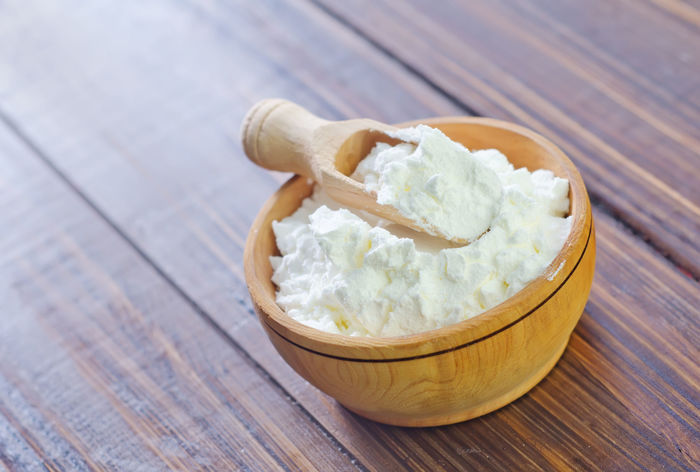Starch
Category
Pasta, rice, flour and derivatives
Seasonal period:
All year
Allergens
White powder extracted from roots, tubers, stems, seeds and leaves of certain vegetables. In Spanish starch extracted from subterranean plant organs is known as “fécula” whereas the one extracted from seeds is known as “almidón” even though they are both starch.
There is cereal starch, (wheat, rice, etc.), potato starch and legume starch (beans lentils, peas, etc.).
Nutritional information (0.1 kg)
Energy
375.0
kcal
Carbohydrates
83.1
g
Proteins
6.9
g
Lipids
0.34
g
Sugars
0.0
g
Salt (Sodium)
0.0
mg
Folic acid
25.0
ug
Vitamin C
0.0
g
Vitamin A
0.0
ug
Zinc
0.54
mg
Iron
1.38
mg
Calcium
0.07
mg
Cholesterol
0.0
mg
Polyunsaturated fatty acids
0.15
g
Monounsaturated fatty acids
0.01
g
Saturates
0.09
g
Fiber
5.9
g
The data is merely a guide and should not be used for medical purposes. Those responsible for the web disclaims any responsibility.
-
Type of dish
- Beers
- Cocktails
- Breakfasts and brunch
- Burguers
- Juices, milkshakes and beverages
- Shellfish
- Bread and pastries
- Pizzas, patty
- Dessert
- Pasta
- Sándwich
- Pastries
- Finger foods
- Ice creams and sorbets
- Legumes
- Salads
- Eggs
- Patty
- liqueur
- Harvard plate
- Main course
- Meats
- Fish
- Birds
- Vegetables
- Soups and creams
- Rices
- Coffee, chocolate and infusion
- Cheeses
- Appetizers and canapes
- Temperature
- Cuisine type
- Additional culinary preparation
- Conservation technique
- Seasonal recipes
-
- Aromatic herbs
- Beverages
- Big game hunt
- Bread and pastries
- Canned goods and pickles
- Cereals
- Condiments, spices and additives
- Cooked, salted, preserved and cold meats
- Dried fruits and nuts
- Dry pulses
- Edible oils and vinegars
- Eggs and derivatives
- Feathered game hunt
- Fish cuts
- Fishes
- Insects
- Kitchen and bakery tecniques
- Kitchen and bakery utensils
- Meat cuts
- Meats
- Milk, cream and derivatives
- Mushrooms
- Offal
- Pasta, rice, flour and derivatives
- Poultry
- Seafood
- Service techniques
- Service utensils
- Vegetables cuts
- Vegetables, fruits, tubers and seaweed

